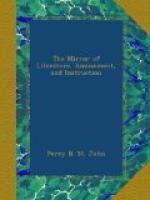We received the following little anecdote from a letter of a gentleman now at the head of the medical profession, with which he favoured us shortly after perusing Salmonia. “I was (says our friend) at the Naval Hospital, at Yarmouth, on the morning when Nelson, after the battle of Copenhagen (having sent the wounded before him,) arrived at the Roads, and landed on the jutty. The populace soon surrounded him, and the military were drawn up in the market-place ready to receive him; but making his way through the crowd, and the dust, and the clamour, he went straight to the hospital. I went round the wards with him, and was much interested in observing his demeanour to the sailors; he stopped at every bed, and to every man he had something kind and cheering to say. At length, he stopped opposite a bed on which a sailor was lying who had lost his right arm close to the shoulder-joint, and the following short dialogue passed between, them:”—Nelson. “Well, Jack, what’s the matter with you?”—Sailor. “Lost my right arm, your honour.”—Nelson paused, looked down at his own empty sleeve, then at the sailor, and said playfully, “Well, Jack, then you and I are spoiled for fishermen—cheer up, my brave fellow.” And he passed briskly on to the next bed; but these few words had a magical effect upon the poor fellow, for I saw his eyes sparkle with delight as Nelson turned away and pursued his course through the wards. As this was the only occasion on which I saw Nelson, I may, possibly, overrate the value of the incident.—Q. Rev.
* * * * *
THE BRITISH ALMANAC.
This work, though only in its second year, is too well known to be benefited by our recommendation. As a compilation, with occasional originality, it is one of the best executed labours of the Society from whom it emanates, and who, from the multiplicity of facts here assembled, may be called “The Society for the” Condensation “of Useful Knowledge.”
In the Almanac for 1829 we notice several improvements upon that of last year. The “Remarks on Weather” are valuable; and the “Garden Plants in Flower” in each month, in themselves extremely interesting, contrast the unchanging course of nature with the grand revolutions and events of the column of “Anniversaries.” Thus, what different emotions are produced by reading April 6, “First Abdication of Bonaparte, 1814,” and “Primrose Peerless (Narcissus biflorus) in flower.” The “Useful Remarks,” though not a new feature in an almanac, are profitable helps to social duties, especially when drawn from such a source as Owen Feltham’s Resolves—a golden treasury of world-knowledge, which may serve as a text-book for every family. Among the useful facts we notice the following:—“By a parliamentary return of the year 1828 we find that the stamp duty paid upon the almanacs of England amounts to 30,136_l_. 3_s_. 9_d_.—which, the duty being fifteen-pence upon each almanac, exhibits a circulation of 451,593 annually.”




